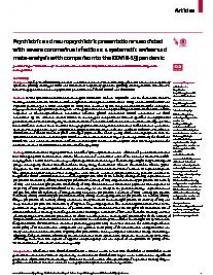Psychiatric and neuropsychiatric presentations associated with severe coronavirus infections : a systematic review and meta-analysis with comparison to the COVID-19 pandemic
Background
Before the COVID-19 pandemic, coronaviruses caused two noteworthy outbreaks: severe acute respiratory syndrome (SARS), starting in 2002, and Middle East respiratory syndrome (MERS), starting in 2012. We aimed to assess the psychiatric and neuropsychiatric presentations of SARS, MERS, and COVID-19.
Methods
In this systematic review and meta-analysis, MEDLINE, Embase, PsycINFO, and the Cumulative Index to Nursing and Allied Health Literature databases (from their inception until March 18, 2020), and medRxiv, bioRxiv, and PsyArXiv (between Jan 1, 2020, and April 10, 2020) were searched by two independent researchers for all Englishlanguage studies or preprints reporting data on the psychiatric and neuropsychiatric presentations of individuals with suspected or laboratory-confirmed coronavirus infection (SARS coronavirus, MERS coronavirus, or SARS coronavirus 2). We excluded studies limited to neurological complications without specified neuropsychiatric presentations and those investigating the indirect effects of coronavirus infections on the mental health of people who are not infected, such as those mediated through physical distancing measures such as self-isolation or quarantine. Outcomes were psychiatric signs or symptoms; symptom severity; diagnoses based on ICD-10, DSM-IV, or the Chinese Classification of Mental Disorders (third edition) or psychometric scales; quality of life; and employment. Both the systematic review and the meta-analysis stratified outcomes across illness stages (acute vs post-illness) for SARS and MERS. We used a random-effects model for the meta-analysis, and the meta-analytical effect size was prevalence for relevant outcomes, I² statistics, and assessment of study quality.
Findings
1963 studies and 87 preprints were identified by the systematic search, of which 65 peer-reviewed studies and seven preprints met inclusion criteria. The number of coronavirus cases of the included studies was 3559, ranging from 1 to 997, and the mean age of participants in studies ranged from 12·2 years (SD 4·1) to 68·0 years (single case report). Studies were from China, Hong Kong, South Korea, Canada, Saudi Arabia, France, Japan, Singapore, the UK, and the USA. Follow-up time for the post-illness studies varied between 60 days and 12 years. The systematic review revealed that during the acute illness, common symptoms among patients admitted to hospital for SARS or MERS included confusion (36 [27·9%; 95% CI 20·5–36·0] of 129 patients), depressed mood (42 [32·6%; 24·7–40·9] of 129), anxiety (46 [35·7%; 27·6–44·2] of 129), impaired memory (44 [34·1%; 26·2–42·5] of 129), and insomnia (54 [41·9%; 22·5–50·5] of 129). Steroid-induced mania and psychosis were reported in 13 (0·7%) of 1744 patients with SARS in the acute stage in one study. In the post-illness stage, depressed mood (35 [10·5%; 95% CI 7·5–14·1] of 332 patients), insomnia (34 [12·1%; 8·6–16·3] of 280), anxiety (21 [12·3%; 7·7–17·7] of 171), irritability (28 [12·8%; 8·7–17·6] of 218), memory impairment (44 [18·9%; 14·1–24·2] of 233), fatigue (61 [19·3%; 15·1–23·9] of 316), and in one study traumatic memories (55 [30·4%; 23·9–37·3] of 181) and sleep disorder (14 [100·0%; 88·0–100·0] of 14) were frequently reported. The meta-analysis indicated that in the post-illness stage the point prevalence of post-traumatic stress disorder was 32·2% (95% CI 23·7–42·0; 121 of 402 cases from four studies), that of depression was 14·9% (12·1–18·2; 77 of 517 cases from five studies), and that of anxiety disorders was 14·8% (11·1–19·4; 42 of 284 cases from three studies). 446 (76·9%; 95% CI 68·1–84·6) of 580 patients from six studies had returned to work at a mean follow-up time of 35·3 months (SD 40·1). When data for patients with COVID-19 were examined (including preprint data), there was evidence for delirium (confusion in 26 [65%] of 40 intensive care unit patients and agitation in 40 [69%] of 58 intensive care unit patients in one study, and altered consciousness in 17 [21%] of 82 patients who subsequently died in another study). At discharge, 15 (33%) of 45 patients with COVID-19 who were assessed had a dysexecutive syndrome in one study. At the time of writing, there were two reports of hypoxic encephalopathy and one report of encephalitis. 68 (94%) of the 72 studies were of either low or medium quality.
Interpretation
If infection with SARS-CoV-2 follows a similar course to that with SARS-CoV or MERS-CoV, most patients should recover without experiencing mental illness. SARS-CoV-2 might cause delirium in a significant proportion of patients in the acute stage. Clinicians should be aware of the possibility of depression, anxiety, fatigue, post-traumatic stress disorder, and rarer neuropsychiatric syndromes in the longer term.
Funding
Wellcome Trust, UK National Institute for Health Research (NIHR), UK Medical Research Council, NIHR Biomedical Research Centre at University College London Hospitals NHS Foundation Trust and University College London.
Geachte bezoeker,
De informatie die u nu opvraagt, kan door psychotraumanet niet aan u worden getoond. Dit kan verschillende redenen hebben,
waarvan (bescherming van het) auteursrecht de meeste voorkomende is. Wanneer het mogelijk is om u door te verwijzen naar de bron
van deze informatie, dan ziet u hier onder een link naar die plek.
Als er geen link staat, kunt u contact opnemen met de bibliotheek,
die u verder op weg kan helpen.
Met vriendelijke groet,
Het psychotraumanet-team.
In: Lancet Psychiatry ; ISSN: 2215-0366
https://doi.org/10.1016/S2215-0366(20)30203-0
Epub ahead of print DOI: 10.1016/S2215-0366(20)30203-0


